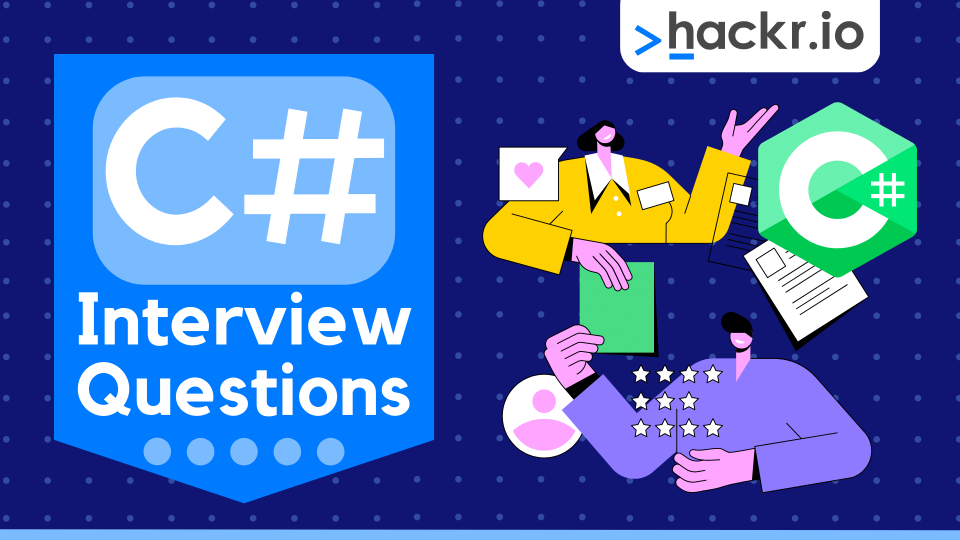


Mastering C#: 60 Common Interview Questions Unveiled
Getting hired as a programmer can be a challenge. There’s a lot of talent out there, and there’s a lot of competition. Many employers are wary of “paper programmers”; people who have no programming experience but just a degree. Because of this, they often ask in-depth programming questions during their interview. These questions can be hard to answer if you haven’t properly prepared. In this article, I’ll help you prepare to ace your next interview with these questions related to the C# programming language. At the same time, you might want to practice with some C# projects. These 50 essential C# questions and answers will help you understand the technical concepts of the language. You’ll walk into a meeting with the hiring manager with confidence. As a developer myself, I use these concepts daily.
So, you've set your sights on a C# development role, and now it's time to face the interview process. To help you prepare and confidently navigate your way through the technical discussions, we've compiled a list of 60 common C# interview questions. Let's dive into the key areas you should be ready to tackle:
Basics of C#
1. **What is C# and its primary use?
2. **Differentiate between value types and reference types.
3. **Explain the concept of boxing and unboxing.
C# Language Fundamentals
4. **What are the access modifiers in C#?
5. **Describe the differences between `const` and `read-only` in C#.
6. **What is the purpose of the `using` statement in C#?
Object-Oriented Programming (OOP) in C#
7. Define polymorphism and provide an example.
8. Explain the concept of encapsulation in C#.
9. What is inheritance, and how is it implemented in C#?
Exception Handling
10. How does exception handling work in C#?
11. Differentiate between `throw` and `throw ex` in exception handling.
12. Explain the purpose of `finally` block in try-catch-finally.
LINQ (Language-Integrated Query)
13. What is LINQ, and why is it useful in C#?
14. Differentiate between `IEnumerable` and `IQueryable` in LINQ.
15. Explain deferred execution in LINQ.**
Asynchronous Programming
16. **What is the `async` and `await` feature in C#?**
17. **Describe the differences between `Task.Run` and `Task.Factory.StartNew`.**
18. **How does error handling work in asynchronous programming?**
.NET Framework and C# Libraries
19. **What is the .NET Framework, and how does it relate to C#?**
20. **Explain the purpose of the `StringBuilder` class in C#.**
21. **What is the role of the Global Assembly Cache (GAC)?**
Memory Management
22. **How does garbage collection work in C#?**
23. **Explain the difference between `Dispose` and `Finalize` methods.**
24. **What is the purpose of the `using` statement in relation to I Disposable objects?**
Web Development with C#
25. **Explain the role of ASP.NET in web development using C#.**
26. **What are the key differences between ASP.NET Web Forms and ASP.NET MVC?**
27. **Describe the purpose of Razor syntax in ASP.NET Core.**
Unit Testing in C#
28. **What is unit testing, and how is it implemented in C#?**
29. **Differentiate between NUnit and MSTest frameworks in C#.**
30. **Explain the concept of mocking in unit testing.**
Design Patterns
31. **Describe the Singleton design pattern in C#.**
32. **What is the Observer pattern, and how is it implemented in C#?**
33. **Explain the differences between the Factory and Abstract Factory patterns. **
Dependency Injection
34. **What is Dependency Injection, and why is it beneficial in C#?**
35. **Explain the role of an IoC (Inversion of Control) container in Dependency Injection.**
36. **Describe Constructor Injection and Property Injection in Dependency Injection.**
Entity Framework
37. **What is Entity Framework, and how does it simplify database operations in C#?**
38. **Explain Code First and Database First approaches in Entity Framework.**
39. **How do migrations work in Entity Framework?**
Serialization
40. **What is serialization, and how is it implemented in C#?**
41. **Differentiate between XML and JSON serialization in C#.**
42. **Explain the role of attributes like `[DataContract]` and `[DataMember]` in serialization.**
Reflection
43. **What is reflection, and how is it used in C#?**
44. **Explain the differences between `GetType()` and `typeof()` in reflection.**
45. **How can you create an instance of a class dynamically using reflection?**
Multithreading
46. **What is multithreading, and how is it achieved in C#?**
47. **Differentiate between `Thread` and `ThreadPool` in C#.**
48. **Explain the purpose of the `lock` keyword in multithreading.**
Security in C#
49. **Describe the role of the `SecureString` class in C#.**
50. **Explain how to prevent SQL injection attacks in C# applications.**
51. **What is Cross-Site Scripting (XSS), and how can it be mitigated in C# web applications?**
.NET Core vs. .NET Framework
52. **What differentiates .NET Core from .NET Framework?**
53. **Explain the advantages of using .NET Core in cross-platform development.**
54. **How does .NET 5 differ from previous versions of .NET Core?**
Miscellaneous
55. **Explain the differences between `IEnumerable` and `IEnumerator` in C#.**
56. **What are extension methods, and how are they used in C#?**
57. **Describe the purpose of the `yield` keyword in C#.**
Future of C# and .NET
58. **What advancements and features are expected in future versions of C#?**
59. **How is C# positioned in the era of cloud computing and serverless architecture?**
60. **Explain the role of C# in the development of cross-platform and mobile applications.**
Conclusion
Arming yourself with answers to these common C# interview questions will undoubtedly boost your confidence and readiness for the challenging world of technical interviews. Happy coding!
0 comments